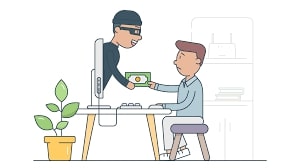Articles
How to Identify and Avoid Forex Trading Scams
If a Forex broker uses aggressive sales techniques to get you to sign up and fund an account quickly, that should raise some serious warning flags. Reputable brokers have no need for these tactics and allow you to explore their services at your own pace.

How to Identify and Avoid Forex Trading Scams
Ever wondered if that flashy forex trading system or broker you saw advertised online was legit? Unfortunately, the forex industry is filled with scams and fraud. As a trader, it's critical you learn how to spot shady operations before they steal your money. We will show you the common signs of forex scams so you can avoid becoming another victim.
Beware of "Get Rich Quick" Promises
Anyone promising you'll get rich quick from forex trading is scamming you. Forex trading is risky business and requires knowledge, skill, and experience to become profitable.
Look out for offers that seem too good to be true, like guaranteed high returns with little risk. There's no such thing as easy money in forex trading. Beware of claims that you'll make thousands within your first week of trading or with only a small initial deposit. Legitimate brokers and educators won't make such unrealistic promises.
Watch out for high-pressure sales tactics to deposit funds immediately or you'll miss out. Reputable brokers won't rush you into trading or depositing money before you understand the risks. Do your own research to find a trusted broker that charges fair commissions and spreads.
Be wary of "black box" automated trading systems that claim huge profits with little work on your end. There are no secret formulas for easy forex profits. You need to gain the knowledge to understand the markets, develop strategies, and manage risks yourself.
Never provide remote access to your computer or account access to anyone. Legitimate forex educators and brokers will not ask for this type of access.
The bottom line is if something sounds too good to be true in forex trading, it almost certainly is. Do your due diligence, learn how to evaluate risks, and be very wary of unsolicited offers, guarantees of easy money, and high-pressure sales tactics. With time and effort, you can become a successful forex trader, but there are no shortcuts. Stay skeptical and trust your instincts - they can help you avoid forex trading scams.
Look Out for Fake Reviews and Testimonials
Scammers are sneaky, and they know the easiest way to lure people in is by making their “opportunity” look legit. That's why so many forex trading scams feature glowing reviews and testimonials on their website. But don't be fooled - many of these are completely fabricated.
First, see if the reviews actually mention the company or product by name. If not, that's a red flag. Legitimate reviewers will specifically talk about their experience with the service. Scammers often just grab generic positive statements that could apply to any company.
Next, do a quick search for the reviewer’s name along with words like “scam” or “review”. You may find that the same person has given suspiciously glowing reviews for other sketchy companies. Or you may find complaints that their identity was stolen to create fake endorsements.
You should also check sites like PropConnect to see the company’s reviews from real traders. If the ratings there contradict the glowing reviews on the company’s own website, that’s a sign their testimonials aren’t trustworthy.
The bottom line is, don’t believe everything you read on a forex trading website. Scammers use every trick in the book to appear legitimate, including fake reviews and testimonials from “satisfied customers”. With a bit of detective work, you can spot these fraudulent endorsements and avoid getting duped. Your money and personal information are at stake, so it pays to be cautious!
Check if the Company Is Registered and Regulated
To avoid forex trading scams, one of the first things you should check is if the company is properly registered and regulated.
Registration and regulation
Legitimate forex brokers will be officially registered as a brokerage firm with a national regulatory agency like the Commodity Futures Trading Commission (CFTC) in the U.S. or the Financial Conduct Authority (FCA) in the U.K. These agencies require brokers to follow strict rules around securing your funds, disclosing risks, and more.
- Make sure the broker provides you their registration number so you can look them up on the regulator’s website to confirm they are listed.
- Be wary of brokers that claim to be registered but provide no details or proof. This is a major red flag.
Some brokers may claim they don’t need to be regulated because forex trading is unregulated. This is untrue and a scam tactic. Forex trading does have regulations that help protect traders.
Customer service and support
Legitimate brokers will also provide responsive customer service and support. They will have ways for you to easily contact them, like phone numbers, live chat options, and email addresses. If they are nearly impossible to reach or don’t reply to your messages, that indicates a scam.
- Test their customer support during the account opening process by contacting them with any questions. See how long they take to reply and the quality of their responses. This small test can reveal a lot.
- Beware of brokers that provide only an email or web contact form as their sole means of communication. It should be easy to reach a live person if needed.
Other warning signs of a potential forex scam include: unrealistic promises of high returns, pressuring you to deposit funds quickly, lack of transparency around fees and spreads, and not providing a demo trading account. The bottom line is if something sounds too good to be true, it likely is. Do your due diligence to avoid being scammed.
Be Wary of High Pressure Sales Tactics
High-pressure sales tactics are a red flag.
If a Forex broker uses aggressive sales techniques to get you to sign up and fund an account quickly, that should raise some serious warning flags. Reputable brokers have no need for these tactics and allow you to explore their services at your own pace.
Watch out for brokers who:
- Offer “limited time only” bonuses or special promotions to get you to deposit funds immediately. These are often scams to get your money before you have time to thoroughly evaluate the broker.
- Call you repeatedly with “can’t miss” opportunities or trades. Legitimate brokers do not push trades on clients or make guarantees about profits.
- Encourage you to borrow money or take out a loan to fund your trading account. This is an unethical and dangerous practice. Never invest money you can’t afford to lose.
- Pressure you to sign forms or documents without explaining them fully. Do notsign anything you don’t understand completely. Ask questions and make sure all terms and conditions are transparent.
If a broker’s representative is aggressively pushing you to deposit funds or sign up for an account, that is a sign they may care more about getting your money than providing you a quality service. Do not feel obligated to continue the conversation. You can say “No, I’m not interested, please do not call me again.” Then report their behavior to the proper authorities.
Legitimate Forex brokers provide educational resources and tools for you to learn at your own pace. They have knowledgeable representatives available to answer your questions but will never pressure you into making a deposit or trade. Trust your instincts—if something feels off, it probably is. Keep looking until you find a broker where you feel fully supported and never rushed into decisions. Your money and financial well-being depend on it.
Conclusion
So in summary, don't get duped by flashy promises of riches, follow your instincts if something feels off, and do your homework. Forex trading can be risky enough without shady brokers and scam artists trying to take you for a ride. Now that you know what to watch out for, you'll be able to spot the dodgy dealers from a mile away. Remember, if it sounds too good to be true, it probably is. Stay skeptical, trust your gut, and keep learning - that's the best way to make sure your money ends up where it should, and not in the pockets of unscrupulous scammers looking to profit from your naivety or greed. Knowledge is power, so arm yourself with information and go into any trading opportunity with your eyes wide open. Stay safe out there!


